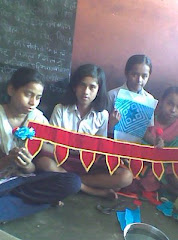The Bihar midday meal tragedy in which over 20 children died after consuming a meal laced with pesticide prepared in their school brings home many well known facts -
1. The facilities in majority of our government run schools are so poor, be it classroom itself, the playground, or the quality of teachers, that it is a crime to call it a school.
2. Providing some sub standard grain and hoping the health of the children improves is a fallacy. Borne out by the fact that even after years of the midday meal scheme, large proportions of Indian children are undernourished, underweight and stunted.
3. The communities these schools serve are so poor and disempowered that they cannot demand their rights to a nourishing, hygienically cooked meal for their children.
4. Therefore, when there are no proper utensils for cooking, or storage, or adequate rations, there is no protest from them or a demand for what is their right.
5. The persons who are enstrusted with the job of preparing the meal get no training in hygiene. India's poor are forced to live in extremely unhygenic conditions and being illiterate and uneducated, they often do not know how such conditions impact their health. In the Bihar case, the person who put the oil in the pesticide container, probably did not realise that pesticide can kill. Probably the person did not know that pesticide should be stored away from food.
And when the children protested over the taste and look of the food cooked, the principal forced them to eat saying nothing could be wrong as the oil had come from her husband's shop.
A question that bothers is why was a pesticide container kept next to the school rations in the first place?
The Bihar government is planning to paint the midday meal safety norms on the walls. Would that help? What happens if the cook is illiterate?
What would help is -
A course in basic hygiene and food storage.
Regular checks by a monitoring team, which should be the members from the community whose children study in the school, or the Village Health and
Sanitation committee or an equivalent local body in the urban areas.
Something that has been seen to work, to improve the standard of the food cooked and served is the involvement of the mothers of the school-going children, be it in procurement, storage and cooking of the rations. It has worked in many parts of Tamil Nadu and I wrote about it three years ago when I saw the state's midday meal programme.
If it can work there, it should work in other states including Bihar, and Uttar Pradesh, home to many midday meal scandals. But for that the 'control' or to use a politically correct word 'management' of the scheme should be in the hands of the parents. The government's role should be of a provider and facilitator, the parents and a teacher representative would be the implementators -- lifting of the rations provided only if they meet a certain quality, preparing and serving of the meals.
More on -
India's midday meal programme
WHO had asked India to ban toxin that killed children
1. The facilities in majority of our government run schools are so poor, be it classroom itself, the playground, or the quality of teachers, that it is a crime to call it a school.
2. Providing some sub standard grain and hoping the health of the children improves is a fallacy. Borne out by the fact that even after years of the midday meal scheme, large proportions of Indian children are undernourished, underweight and stunted.
3. The communities these schools serve are so poor and disempowered that they cannot demand their rights to a nourishing, hygienically cooked meal for their children.
4. Therefore, when there are no proper utensils for cooking, or storage, or adequate rations, there is no protest from them or a demand for what is their right.
5. The persons who are enstrusted with the job of preparing the meal get no training in hygiene. India's poor are forced to live in extremely unhygenic conditions and being illiterate and uneducated, they often do not know how such conditions impact their health. In the Bihar case, the person who put the oil in the pesticide container, probably did not realise that pesticide can kill. Probably the person did not know that pesticide should be stored away from food.
And when the children protested over the taste and look of the food cooked, the principal forced them to eat saying nothing could be wrong as the oil had come from her husband's shop.
A question that bothers is why was a pesticide container kept next to the school rations in the first place?
The Bihar government is planning to paint the midday meal safety norms on the walls. Would that help? What happens if the cook is illiterate?
What would help is -
A course in basic hygiene and food storage.
Regular checks by a monitoring team, which should be the members from the community whose children study in the school, or the Village Health and
Sanitation committee or an equivalent local body in the urban areas.
Something that has been seen to work, to improve the standard of the food cooked and served is the involvement of the mothers of the school-going children, be it in procurement, storage and cooking of the rations. It has worked in many parts of Tamil Nadu and I wrote about it three years ago when I saw the state's midday meal programme.
If it can work there, it should work in other states including Bihar, and Uttar Pradesh, home to many midday meal scandals. But for that the 'control' or to use a politically correct word 'management' of the scheme should be in the hands of the parents. The government's role should be of a provider and facilitator, the parents and a teacher representative would be the implementators -- lifting of the rations provided only if they meet a certain quality, preparing and serving of the meals.
More on -
India's midday meal programme
WHO had asked India to ban toxin that killed children
.jpg)





+(2).jpg)


3 comments:
22 lives were nipped in bud. Wonder what made the school authorities to store a pesticide container along with food. My heart goes out for the parents and families of the young victims. All the little ones did was to have a meal which killed them. Sad and pathetic state of affairs! With no proper framework and monitoring system in place, these mid-day mean schemes will never achieve the very goal for which they were implemented - nourish children from poor families. Rest in peace, young ones.
Yes, Sandhya. The little ones paid the price for the indifference on the part of adults. It is sad to see how those who are responsible for the welfare and well being of the children fail them. In this case literally murdered them.
Dear Sree i have seen your blog it is great i salute for your efforts
If i get an opportunity to join with you for making efforts to change i will be blessed by the almighty
I am working for HINDUSTAN LEVER AS GM PURCHASE .IF YOU HAVE ANY ORG WHO FEED S CHILDREN S MEALS I AM READY TO GIVE ALL THE BRANDED FOOD ITEMS TO THEM TO SUPPORT TO MY LIFE END
KINDLY MAIL ME HOW TO COMMUNICATE WITH YOU FOR FURTHER ACTION
REGARDS
SRINIVASAN
Email id srinivasaaraamudhan@gmail.com
Post a Comment